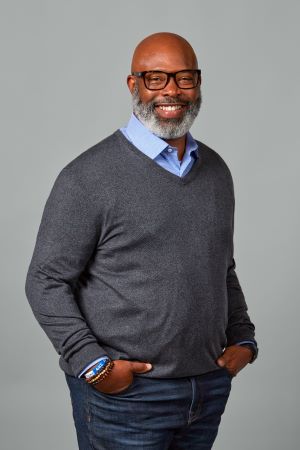Antoine Andrews’ diversity, equity, and inclusion (DEI) journey is both inspiring and instructive. Recounting the early days of his career, after graduating from Rutgers University, Andrews spent 9 years working as an account manager in group insurance at Prudential Financial before moving into his first DEI role at Bristol-Myers Squibb in 2002. As he navigated leadership roles at renowned organizations like Gap Inc., Symantec, Nike, and Year Up, he honed his skills in crafting strategic road maps for DEI and social impact.
And his passion wasn’t just limited to strategy.
“Developing talent and coaching leaders within the organization is a passion of mine,” says Andrews. “I actively seek opportunities to coach leaders in inclusivity, talent development, strategy development, feedback, and leadership presence.” Such a hands-on approach has not only enriched his professional journey but also enabled him to forge invaluable relationships pivotal to the evolution of DEI and social impact outcomes.
A Catalyst for Change: Embracing the Role at SurveyMonkey
Andrews’ transition to SurveyMonkey in February 2021 marked a significant chapter in his career. Before this move, he served as the chief DEI officer at Year Up, a nonprofit dedicated to empowering young adults. Under his stewardship, Year Up’s DEI initiatives expanded to encompass antiracism, equity, and inclusion.
However, it was the tragic event of George Floyd’s murder that acted as a catalyst for Andrews. “The catalyst for me exploring the opportunity with SurveyMonkey was the murder of George Floyd,” he explains. “The key motivating factor for my career choice is all about sustainable impact.” SurveyMonkey, with its expansive platform, was the perfect avenue for him to further DEI’s cause and drive tangible results.
Carving a New Path: The Role of CDIO at SurveyMonkey
When Andrews joined SurveyMonkey in early 2021, he stepped into a freshly minted role: chief diversity and social impact officer (CDIO). This wasn’t just a new title; it was a testament to SurveyMonkey’s commitment to fostering a diverse and inclusive workplace.
Under the leadership of then-CEO Zander Lurie, Andrews says, the company sought to make a tangible commitment to DEI.
Andrews’ vision for the role is clear and impactful. His role, he says, “is to amplify diverse voices and give more people a seat at the table—where decisions are being made—where they can truly make an impact.” For him, DEI isn’t just a corporate initiative; it’s a lens through which businesses should operate. He passionately states, “I strongly believe diversity, equity, and inclusion aren’t just words; they are a filter through which we operate our teams and businesses to deliver positive social impact.”
Innovative Approaches to DEI at SurveyMonkey
SurveyMonkey’s approach to DEI is both comprehensive and forward-thinking. The company doesn’t just rely on traditional metrics; it combines HR data with employee sentiment data to gain a holistic understanding of the employee experience.
Andrews elaborates on this unique approach: “SurveyMonkey’s approach to DEI combines human resource data on representation, talent pipeline, and career progression alongside employee sentiment data to better understand the complete employee lived-experience,” he explains.
This data-driven approach is complemented by tangible actions. Andrews highlights some of the company’s initiatives: “Recent examples include teams that introduced accessible DEI-specific training and policies and an established Supplier Diversity Program, along with some of our key vendors, in order to support minority-owned small businesses.”
Furthermore, SurveyMonkey’s products are designed to drive sustainable change by capturing genuine human sentiment, ensuring organizations gather authentic and actionable insights.
Employee Resource Groups: Building Communities at SurveyMonkey
SurveyMonkey recognizes the power of community in driving DEI initiatives, and employee resource groups (ERGs) play a pivotal role in this endeavor.
Andrews proudly shares, “Our Employee Resource Groups play an important role in cultivating community and empowering employees to voluntarily come together around common interests.” These ERGs, which are led entirely by employees, span a diverse range of focus areas. From supporting female engineers to championing the welfare and leadership aspirations of the black community, these groups are at the heart of SurveyMonkey’s DEI efforts.
But the company’s commitment doesn’t stop there. Andrews elaborates on its broader community initiatives, stating, “We also foster DEI through Diversity, Inclusion and Impact Groups (DIIGs) worldwide to drive locally-relevant events, training, and programming.” These groups, in conjunction with strategic partnerships with organizations like The Leadership Consortium and Advancing Women Executives, provide leaders with access to exclusive leadership development curricula.
Setting the Gold Standard: SurveyMonkey’s Unique DEI Initiatives
In the competitive corporate landscape, what sets SurveyMonkey apart in the DEI arena? For Andrews, it’s the company’s unwavering commitment to stakeholder feedback and measurable outreach.
“Stakeholder feedback is one of our greatest assets in making progress against our DEI and social impact objectives,” he stresses. This feedback-driven approach has led to significant milestones, such as tripling employee volunteerism and doubling efforts to diversify the leadership pipeline.
SurveyMonkey’s initiatives, such as SurveyMonkey Together, have further bolstered its social impact. “Over the past several years, we have been able to develop a strong pipeline of future leadership within our organization because of this program and its offerings,” Andrews shares.
Supporting a Diverse Workforce at SurveyMonkey
SurveyMonkey’s commitment to diversity is unwavering. “Amplifying voices that are not typically heard is a core principle of who we are,” Andrews asserts. Through its own survey tools, it captures employee sentiments on topics like gender and diversity, ensuring underrepresented voices are heard and acted upon.
The ‘Ask, Listen, Act’ Approach to Inclusivity
SurveyMonkey’s “Ask, Listen, Act” methodology is central to fostering an inclusive culture. Andrews emphasizes the importance of this iterative process, noting that genuine employee feedback is invaluable. “Asking and listening without acting is futile,” he states, underscoring the company’s proactive stance on DEI.
SurveyMonkey, under Andrews’ leadership, is an example of a company that’s deeply committed to DEI, ensuring every voice is heard, valued, and acted upon.
It’s clear that for SurveyMonkey—and for Andrews—DEI isn’t just a corporate responsibility; it’s an integral part of its DNA.
Lin Grensing-Pophal is a Contributing Editor at HR Daily Advisor.

